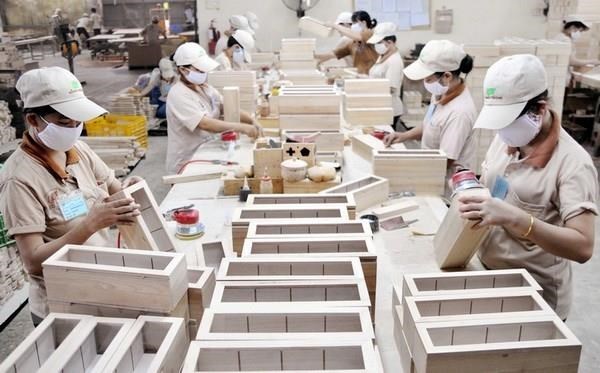[ad_1]

HÀ NỘI – The forestry sector had set a target of earning US$12.5 billion from exports of timber and timber products this year, up 10 per cent year-on-year, said Phạm Văn Điển, deputy director general of the Việt Nam Administration of Forestry (VNFOREST).
During a conference in Hà Nội on Thursday to review the sector’s performance last year and launch tasks for this year, Điển said it had targeted 5-5.5 per cent growth in forestry production value.
To achieve this, VNFOREST would intensify the implementation of programmes approved by the Government, especially the Prime Minister’s Directive 08/CT-TTg on measures and tasks for the rapid and sustainable development of wood and forest products processing.
It would also realise the Voluntary Partnership Agreement on Forest Law Enforcement, Governance and Trade between Việt Nam and the European Union, and improve the capacity of parties involved in the process.
Việt Nam mainly exported its wooden products to the US and China, accounting for 51 per cent and 10.5 per cent of the total national forest product export value, respectively. Therefore, the nation should form an export development strategy due to potential risks from the US-China trade war, experts said at the conference.
Speaking at the event, Deputy Minister of Agriculture and Rural Development Hà Công Tuấn asked VNFOREST to promptly complete a national forestry development plan and submit it to the Government for review.
He suggested issuing criteria for sustainable forest management and restructuring of the sector.
On forest protection and firefighting, this would ensure that violations of forest protection laws and the area of damaged forests would be reduced by 10 per cent and 30 per cent, respectively.
Last year, forestry export value hit $11.2 billion, up 19.2 per cent annually, with a trade surplus of $8.65 billion. Việt Nam was fifth globally, second in Asia, and first in Southeast Asia in terms of forest product exports.
At present, Việt Nam’s wooden and forest products are exported to 140 countries and territories. Major markets include the US, Japan, China and South Korea, that reached $9.71 billion last year, accounting for 86.5 per cent of the total export value.
Meanwhile, the nation spent about $2.5 billion last year, an increase of 9.3 per cent compared to 2018, to import timber and wooden products from about 100 countries and territories. Its major import markets included China, the US, Cameroon, Thailand and Chile, accounting for 54 per cent of the total value, or $1.36 billion.
Forest coverage reached 41.85 per cent, up 0.2 per cent from 2018. The nation planted over 239,000ha of forests in 2019, up 12.6 per cent against the plan. VNS
[ad_2]
Source link
